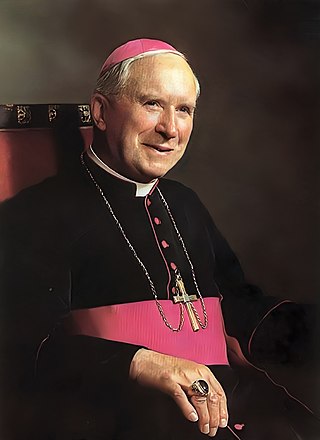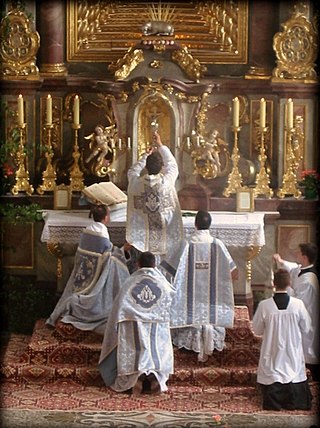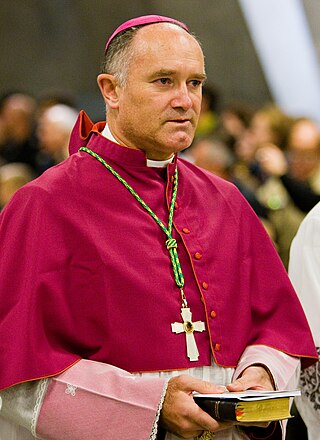
Marcel François Marie Joseph Lefebvre was a French Catholic archbishop who greatly influenced modern traditional Catholicism. In 1970, he founded the Society of Saint Pius X (SSPX), a community to train seminarians, in the village of Écône, Switzerland. In 1988, he was excommunicated from the Catholic Church for consecrating four bishops against the express prohibition of Pope John Paul II.

Traditionalist Catholicism is a movement encompassing members of the Catholic Church and offshoot groups of the Catholic Church that emphasizes beliefs, practices, customs, traditions, liturgical forms, devotions and presentations of teaching associated with the Church before the Second Vatican Council (1962–65). Traditionalist Catholics particularly emphasize the Tridentine Mass, a form of the Roman Rite largely replaced in general use by the post-Second Vatican Council Mass of Paul VI.

The Society of Saint Pius X, also known as the Lefebvrists, is an international fraternity of traditionalist Catholic priests founded in 1970 by Archbishop Marcel Lefebvre, a leading traditionalist voice at the Second Vatican Council with the Coetus Internationalis Patrum and Superior General of the Holy Ghost Fathers until 1968. The society was initially established as a pious union of the Catholic Church with the permission of François Charrière, the Bishop of Lausanne, Geneva and Fribourg in Switzerland. In 2022, the society reached over 700 priestly members, with 1,135 total members.

Emmanuel Milingo is an excommunicated former Roman Catholic archbishop from Zambia. He was ordained in 1958; in 1969, aged 39, Milingo was consecrated by Pope Paul VI as the bishop of the Archdiocese of Lusaka. In 1983, he stepped down from his position as Archbishop of Lusaka after criticism for exorcism and faith healing practices that were not approved by church authorities. In 2001, when Milingo was 71, he received a marriage blessing from Sun Myung Moon, the leader of the Unification Church, despite the prohibition on marriage for ordained priests. In July 2006, he established Married Priests Now!, an advocacy organization to promote the acceptance of married priests in the Roman Catholic Church.

Roy Bourgeois is an American activist, a former Catholic priest, and the founder of the human rights group School of the Americas Watch. He is the 1994 recipient of the Gandhi Peace Award and the 2011 recipient of the American Peace Award and also has been nominated for the Nobel Peace Prize.
Ecclesia Dei is the document Pope John Paul II issued on 2 July 1988 in reaction to the Ecône consecrations, in which four priests of the Society of Saint Pius X were ordained as bishops despite an express prohibition by the Holy See. The consecrating bishop and the four priests consecrated were excommunicated. John Paul called for unity and established the Pontifical Commission Ecclesia Dei to foster a dialogue with those associated with the consecrations who hoped to maintain both loyalty to the papacy and their attachment to traditional liturgical forms.

Bernard Fellay is a Swiss bishop and former superior general of the Traditionalist Catholic priestly fraternity Society of Saint Pius X (SSPX). In 1988, Pope John Paul II announced that Fellay and three others were automatically excommunicated for being consecrated as bishops by Archbishop Marcel Lefebvre, an act that the Holy See described as "unlawful" and "schismatic". Archbishop Lefebvre, and Bishop Antônio de Castro Mayer who co-consecrated these four bishops, were also said to be automatically excommunicated. At that time, he was the youngest bishop of the Roman Catholic Church at 30 years old.
Christine Mayr-Lumetzberger is a teacher and former Benedictine nun who was excommunicated from the Roman Catholic Church when she and six others were ordained as priests by an Independent Catholic bishop in 2002, she called herself a Roman Catholic priest, and she refused to recant. She was ordained a bishop in 2003 along with Gisela Forster; reportedly, the ordination was performed by Roman Catholic bishops whose identity remains a secret.
Validity and liceity are concepts in the Catholic Church. Validity designates an action which produces the effects intended; an action which does not produces the effects intended is considered "invalid". Liceity designates an action which has been performed legitimately; an action which has not been performed legitimately is considered "illicit". Some actions can be illicit, but still be valid.
Latae sententiae and ferendae sententiae are ways sentences are imposed in the Catholic Church in its canon law.
Mary Ramerman is one of the founders of the Spiritus Christi church in Rochester, New York. Ramerman, a convert to Catholicism from Methodism who wished to become a priest, was encouraged by the Reverend James Callan, who was serving as Administrator of Corpus Christi parish in Rochester, to migrate to his parish from her native California to join the staff.
Ordinatio sacerdotalis is an apostolic letter issued by Pope John Paul II on 22 May 1994. In this document, John Paul II discussed the Catholic Church's position requiring "the reservation of priestly ordination to men alone" and wrote that "the Church has no authority whatsoever to confer priestly ordination on women". While the document states that it was written so "that all doubt may be removed regarding a matter of great importance", it has been contested by some Catholics, as to both the substance and in the authoritative nature of its teaching.
The Danube Seven are a group of seven women from Germany, Austria and the United States who were ordained as priests on a ship cruising the Danube river on 29 June 2002 by Rómulo Antonio Braschi, Ferdinand Regelsberger, and a third unknown bishop.
Rómulo Antonio Braschi is an Argentine independent Catholic bishop, not in communion with the Catholic Church. Braschi was labeled as being an episcopus vagans in the early 2000s.

The Écône consecrations were Catholic episcopal consecrations in Écône, Switzerland, on 30 June 1988 performed by Archbishop Marcel Lefebvre and Bishop Antônio de Castro Mayer. The bishops consecrated were four priests of Lefebvre's Society of Saint Pius X (SSPX). The consecrations, performed against the explicit orders of Pope John Paul II, represented a milestone in the troubled relationship of Lefebvre and the SSPX with the Church leadership. The Holy See's Congregation for Bishops issued a decree signed by its Prefect Cardinal Bernardin Gantin declaring that Lefebvre had incurred automatic excommunication by consecrating the bishops without papal consent, thus putting himself and his followers in schism.
Roman Catholic Womenpriests (RCWP) is an independent international organization that claims a connection to the Roman Catholic Church. It is descended from the Danube Seven, a group of women who assert that they were ordained as priests in 2002 by Rómulo Antonio Braschi, before being excommunicated by the Vatican, and their request for a revocation of the excommunication denied, in Decree on the Attempted Ordination of Some Catholic Women. According to a book published by the organization, Women Find a Way: The Movement and Stories of Roman Catholic Womenpriests, at least two other unnamed bishops were involved in the ordination. In addition, the RCWP considers these bishops to be in good standing, and the RCWP says the bishops acted in full apostolic succession.
The canonical situation of the Society of Saint Pius X (SSPX), a group founded in 1970 by Archbishop Marcel Lefebvre, is unresolved.

In the liturgical traditions of the Catholic Church, the term ordination refers to the means by which a person is included in one of the holy orders of bishops, priests or deacons. The teaching of the Catholic Church on ordination, as expressed in the 1983 Code of Canon Law, the Catechism of the Catholic Church, and the apostolic letter Ordinatio sacerdotalis, is that only a Catholic male validly receives ordination, and "that the Church has no authority whatsoever to confer priestly ordination on women and that this judgment is to be definitively held by all the Church's faithful." In other words, the male priesthood is not considered by the church a matter of policy but an unalterable requirement of God. As with priests and bishops, the church ordains only men as deacons.
In the canon law of the Catholic Church, excommunication is a form of censure. In the formal sense of the term, excommunication includes being barred not only from the sacraments but also from the fellowship of Christian baptism. The principal and severest censure, excommunication presupposes guilt; and being the most serious penalty that the Catholic Church can inflict, it supposes a grave offense. The excommunicated person is considered by Catholic ecclesiastical authority as an exile from the Church, for a time at least.






